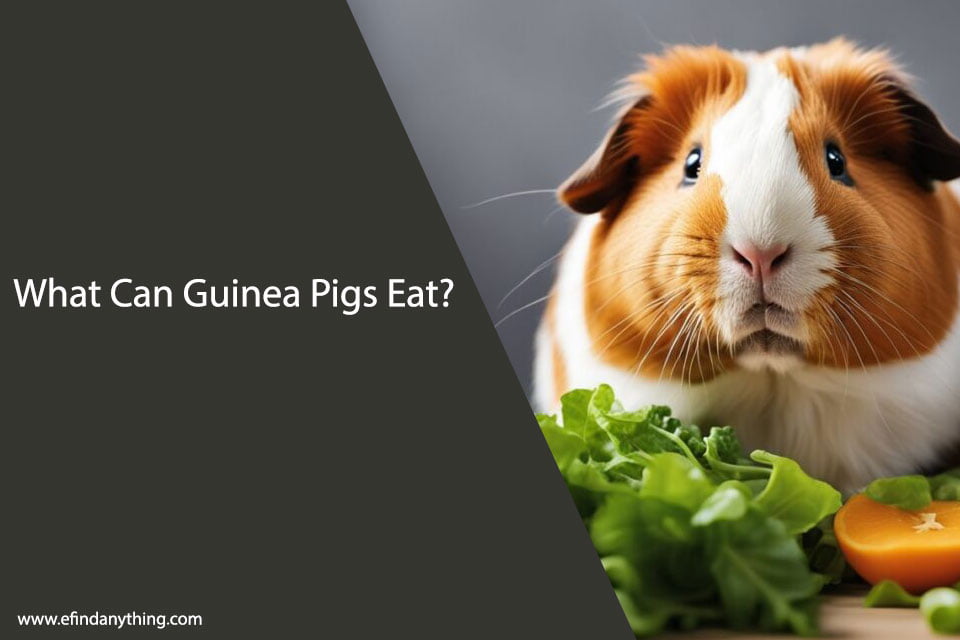Guinea pigs are adorable, social animals that make excellent pets. These furry little creatures are herbivores, which means they only eat plants. However, not all plants are safe for guinea pigs to consume. As responsible pet owners, it is crucial to know what foods are safe for our furry friends to eat.
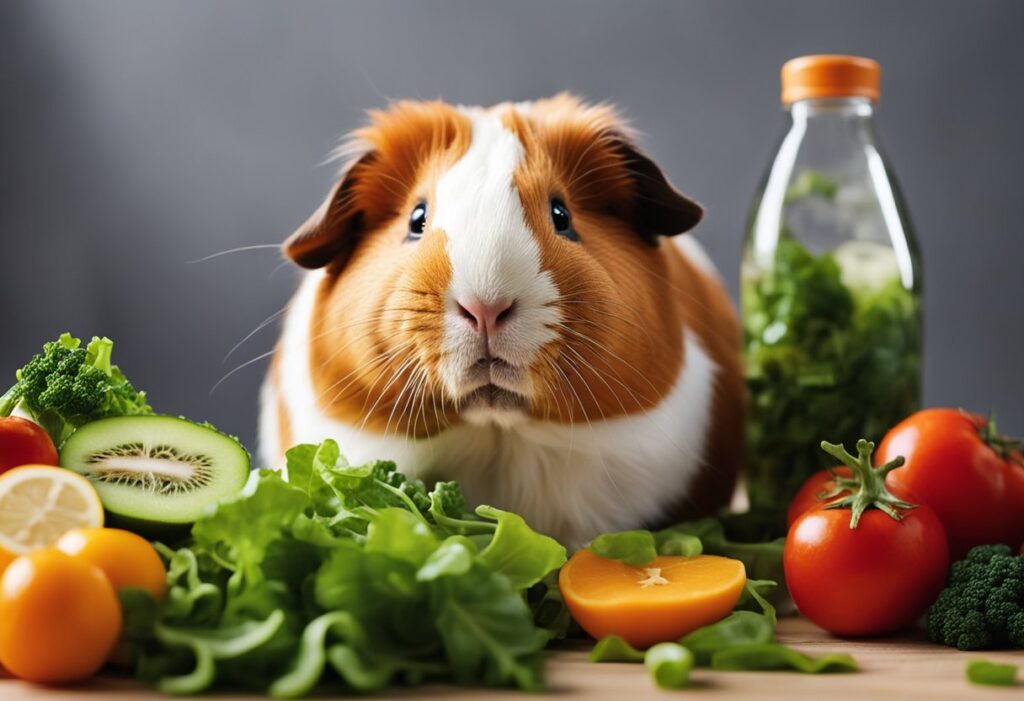
When it comes to feeding guinea pigs, it is essential to provide them with a balanced diet that meets their nutritional needs. Guinea pigs require a diet that is high in fiber, vitamin C, and low in fat. Feeding them the wrong foods can lead to health problems such as obesity, dental issues, and digestive problems. Therefore, it is crucial to know what foods are safe and suitable for guinea pigs to eat.
In this article, we will discuss the different types of foods that are safe for guinea pigs to consume. We will also provide you with a list of foods that you should avoid feeding your guinea pig. By the end of this article, you will have a better understanding of what foods are safe and suitable for your furry friend.
Table of Contents
What Guinea Pigs Eat
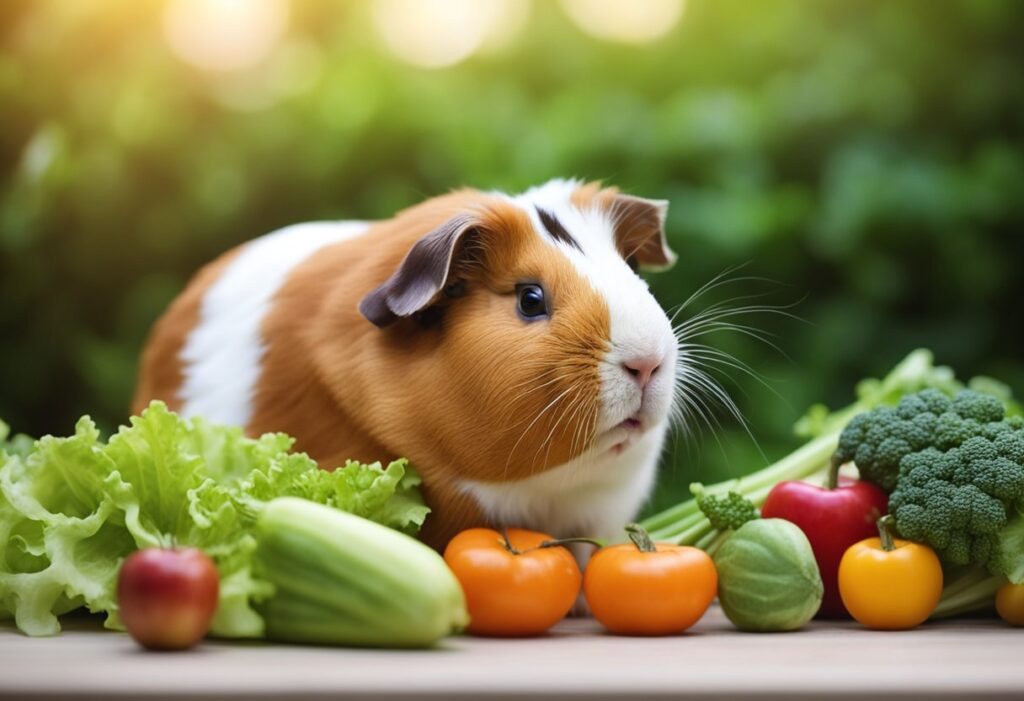
Guinea pigs are herbivores, which means they eat only plants. A healthy diet for a guinea pig consists of hay, vegetables, and fruits, as well as pellets that are specially formulated for guinea pigs.
Vegetables
Vegetables are an essential part of a guinea pig’s diet. They provide important vitamins and minerals that help keep your pet healthy. Some good vegetables for guinea pigs include:
- Romaine lettuce
- Carrots
- Bell peppers
- Cucumbers
- Broccoli
- Kale
It’s important to introduce new vegetables slowly and in small amounts to avoid upsetting your guinea pig’s digestive system.
Fruits
Fruits are a tasty treat for guinea pigs, but they should be given in moderation due to their high sugar content. Some good fruits for guinea pigs include:
- Apples
- Bananas
- Blueberries
- Grapes
- Strawberries
- Watermelon
Remember to remove any seeds or pits from the fruit before giving it to your guinea pig.
Hay
Hay is an important part of a guinea pig’s diet. It provides fiber that helps keep your pet’s digestive system healthy. Timothy hay is a good choice for guinea pigs, but other types of grass hay are also acceptable.
Pellets
Pellets are a convenient way to ensure that your guinea pig is getting all the nutrients they need. Look for pellets that are specifically formulated for guinea pigs, as other types of pellets may not provide the right balance of nutrients.
Overall, a healthy diet for a guinea pig consists of a variety of vegetables, fruits, hay, and pellets. Make sure to provide fresh food and water daily, and avoid giving your guinea pig any foods that are high in sugar or fat.
What Guinea Pigs Cannot Eat
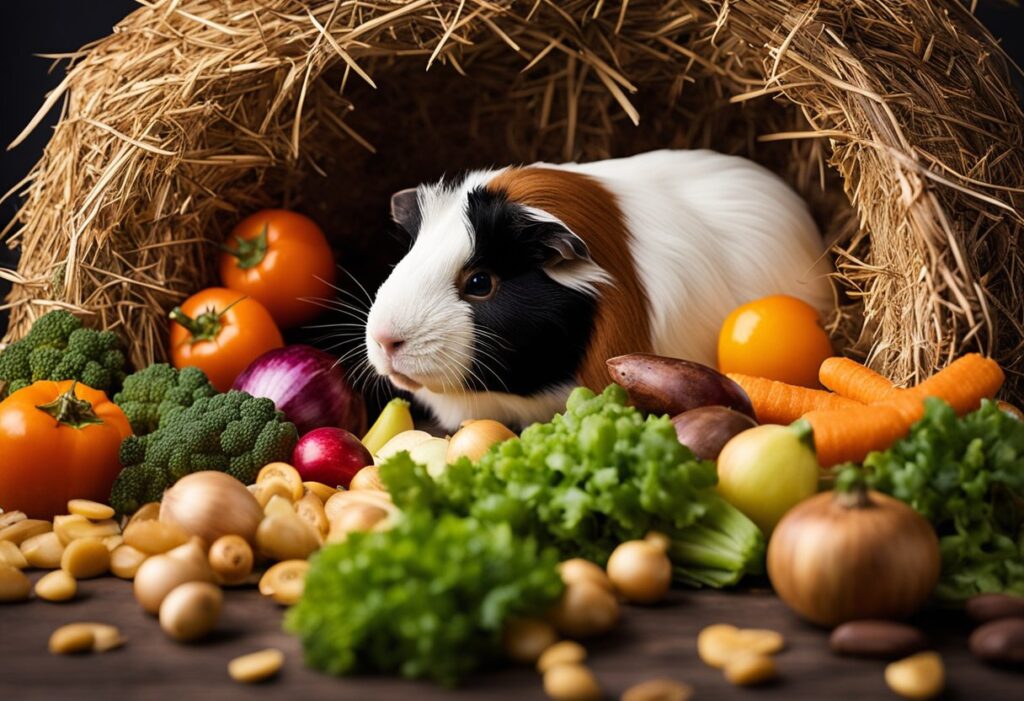
As much as we love to spoil our guinea pigs with treats, there are certain foods that are harmful to their health. Here are some of the foods that we should avoid feeding our guinea pigs:
Harmful Vegetables and Fruits
Some vegetables and fruits can cause digestive problems and even be toxic to guinea pigs. These include:
- Avocado: contains persin which can be toxic to guinea pigs
- Potato: contains solanine which can be harmful to guinea pigs
- Rhubarb: contains oxalic acid which can cause kidney damage
- Tomato leaves and stems: contain solanine which can be harmful to guinea pigs
Processed Foods
Processed foods can be high in sugar, salt, and fat, and can cause health problems for guinea pigs. These include:
- Chocolate: contains theobromine which can be toxic to guinea pigs
- Junk food: contains high amounts of salt, sugar, and fat which can cause obesity and other health problems
- Human snacks: many human snacks contain ingredients that are harmful to guinea pigs, such as garlic and onion powder
Toxic Plants
Some plants can be toxic to guinea pigs if ingested. These include:
- Daffodils: contain lycorine which can cause vomiting, diarrhea, and abdominal pain
- Ivy: can cause skin irritation and digestive problems
- Lily of the Valley: can cause heart problems and seizures
It’s important to always research and double-check before feeding your guinea pig any new foods. When in doubt, it’s best to stick to a balanced diet of hay, fresh vegetables, and a small amount of pellets.
Feeding Schedule for Guinea Pigs
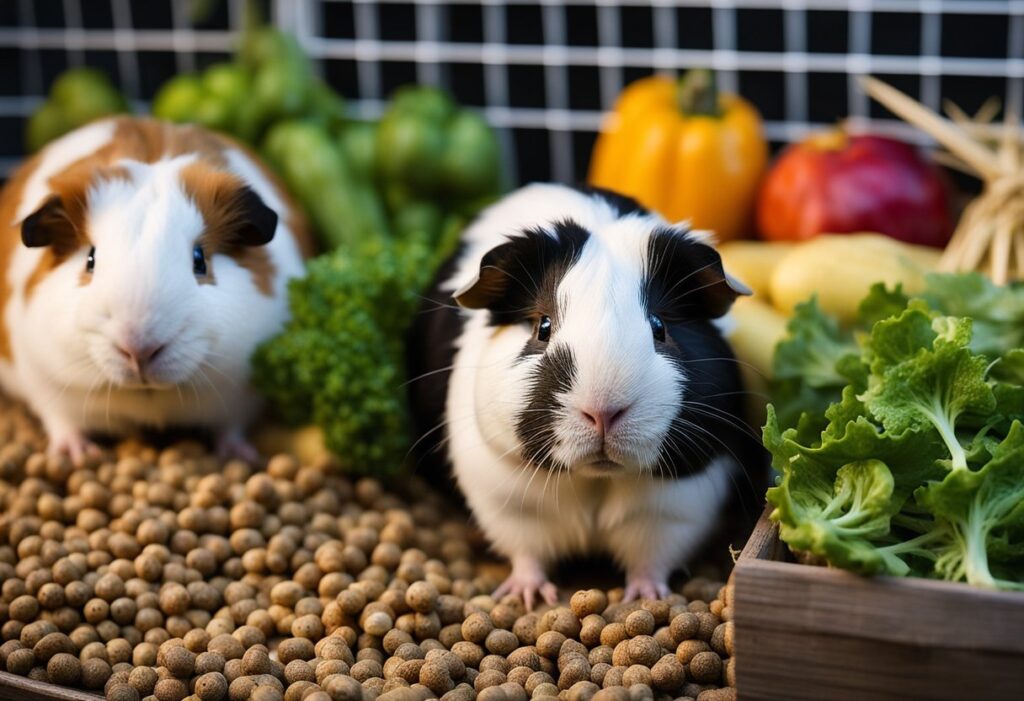
When it comes to feeding guinea pigs, it’s important to establish a consistent feeding schedule. This helps ensure that your guinea pig is getting the right amount of nutrients and prevents overfeeding.
We recommend feeding your guinea pig twice a day, once in the morning and once in the evening. Each feeding should consist of a small amount of fresh vegetables, hay, and pellets.
Hay should be available to your guinea pig at all times. This is important for their digestive health and helps keep their teeth from overgrowing. We recommend providing a mix of hay, such as timothy, orchard grass, and meadow hay, to keep things interesting for your guinea pig.
In addition to hay, your guinea pig should also receive a small amount of fresh vegetables each day. This can include leafy greens like kale, spinach, and romaine lettuce, as well as other veggies like carrots, bell peppers, and cucumbers. It’s important to introduce new vegetables gradually to avoid upsetting your guinea pig’s stomach.
Finally, your guinea pig should also receive a small amount of pellets each day. Look for high-quality pellets that are specifically formulated for guinea pigs and avoid those that contain added sugars or fillers. Pellets should make up no more than 1/8 of your guinea pig’s daily diet.
By following this feeding schedule, you can ensure that your guinea pig is getting the right amount of nutrients and staying healthy.
Effects of Improper Diet
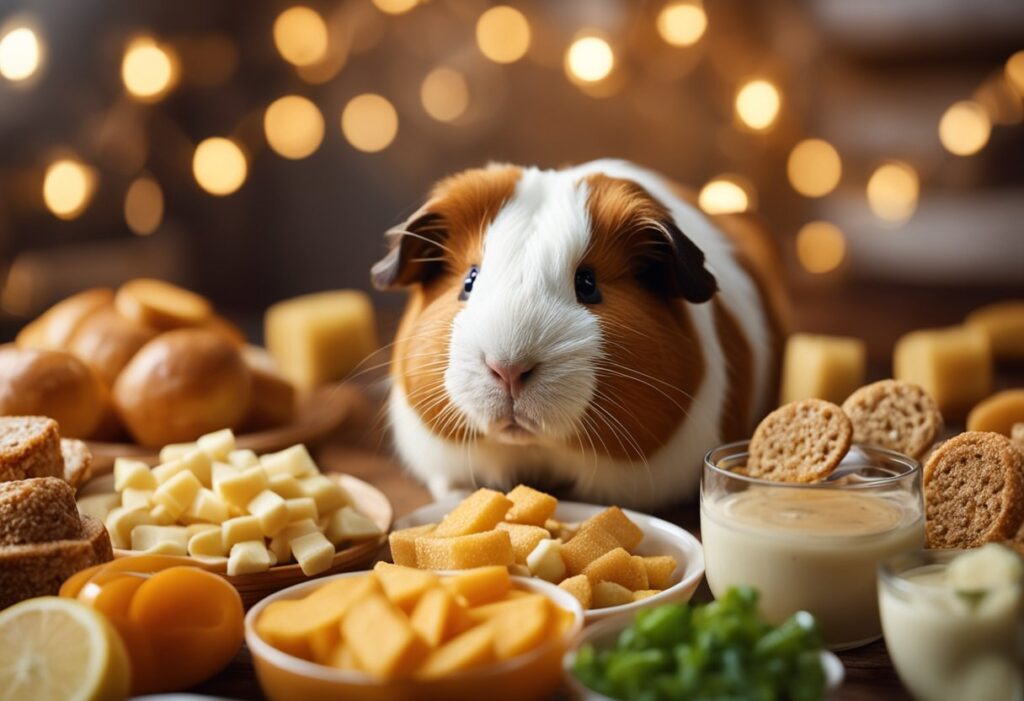
A guinea pig’s diet is crucial to their overall health and well-being. Feeding them an improper diet can lead to various health problems. Here are some of the effects of an improper diet:
Dental Problems
Guinea pigs have continuously growing teeth, and they require a diet that is high in fiber to keep their teeth healthy. Feeding them a diet low in fiber can lead to dental problems such as overgrown teeth, which can cause pain, discomfort, and difficulty eating.
Digestive Issues
Guinea pigs have a sensitive digestive system, and feeding them an improper diet can lead to digestive issues such as diarrhea, constipation, and bloating. Feeding them too much fresh produce or sugary treats can upset their digestive system and lead to health problems.
Vitamin C Deficiency
Guinea pigs cannot produce their own vitamin C, and they require a diet that is high in vitamin C to prevent health problems such as scurvy. Feeding them an improper diet that lacks vitamin C can lead to health problems such as weakened immune system, joint pain, and lethargy.
Obesity
Feeding guinea pigs a diet that is high in fat and low in fiber can lead to obesity, which can cause health problems such as diabetes, heart disease, and joint pain. It is essential to feed them a balanced diet that is high in fiber and low in fat to maintain a healthy weight.
In conclusion, feeding a guinea pig an improper diet can lead to various health problems. It is essential to provide them with a balanced diet that is high in fiber, vitamin C, and low in fat to maintain their overall health and well-being.
Understanding Guinea Pig’s Dietary Needs

As owners of guinea pigs, we must understand their dietary needs to ensure their health and well-being. Guinea pigs are herbivores, which means they eat only plant-based foods. Their digestive system is designed to process fibrous foods, and they require a diet high in fiber.
One of the most important components of a guinea pig’s diet is hay. Hay provides the necessary fiber for their digestive system and helps keep their teeth healthy. Timothy hay is the most common type of hay fed to guinea pigs, but other varieties such as orchard grass and meadow hay can also be given. It’s important to provide fresh hay daily and remove any old or soiled hay to prevent mold growth.
In addition to hay, guinea pigs also require fresh vegetables and fruits. Leafy greens such as kale, spinach, and romaine lettuce are excellent sources of vitamins and minerals. Other vegetables such as bell peppers, carrots, and cucumbers can also be given in moderation. Fruits such as apples, strawberries, and blueberries can be given as occasional treats, but they should not be a significant part of their diet due to their high sugar content.
Lastly, guinea pigs require a source of vitamin C as they cannot produce it themselves. Vitamin C can be found in fresh vegetables such as bell peppers, kale, and broccoli. Alternatively, vitamin C supplements can be added to their water or food.
Overall, a balanced diet consisting of hay, fresh vegetables, and a source of vitamin C is essential for a guinea pig’s health. It’s important to avoid feeding them foods that are high in sugar, fat, or salt as these can lead to health issues such as obesity and dental problems.
Tips for Feeding Guinea Pigs
When it comes to feeding guinea pigs, there are a few things to keep in mind to ensure they are getting a healthy and balanced diet. Here are some tips to help you feed your guinea pig:
- Provide fresh water: Guinea pigs need access to fresh water at all times. Make sure to change their water daily and use a water bottle or heavy ceramic bowl to prevent spills.
- Offer hay: Hay is an essential part of a guinea pig’s diet. It helps keep their teeth healthy and aids in digestion. Offer a variety of hay, such as timothy, orchard grass, or meadow hay.
- Give fresh vegetables: Guinea pigs love fresh vegetables, and they are an excellent source of vitamins and minerals. Offer a variety of vegetables, such as carrots, bell peppers, kale, and spinach. Avoid feeding them iceberg lettuce, as it has little nutritional value.
- Limit fruits: While fruits are a tasty treat for guinea pigs, they should be given in moderation due to their high sugar content. Offer small amounts of fruits such as strawberries, blueberries, and apples.
- Provide pellets: Pellets are a convenient way to ensure your guinea pig is getting all the necessary nutrients. Look for high-quality pellets made specifically for guinea pigs and avoid those with added sugars or fillers.
By following these tips, you can provide your guinea pig with a healthy and balanced diet that will keep them happy and thriving.
Frequently Asked Questions
Can guinea pigs eat carrots?
Yes, guinea pigs can eat carrots. However, carrots should be given in moderation as they are high in sugar. We recommend giving your guinea pig a small piece of carrot once or twice a week.
Can guinea pigs eat cabbage?
Yes, guinea pigs can eat cabbage. Cabbage is a good source of vitamin C and other nutrients. However, too much cabbage can cause gas and bloating in guinea pigs. We recommend giving your guinea pig a small piece of cabbage once or twice a week.
Can guinea pigs eat broccoli?
Yes, guinea pigs can eat broccoli. Broccoli is a good source of vitamin C and other nutrients. However, too much broccoli can cause gas and bloating in guinea pigs. We recommend giving your guinea pig a small piece of broccoli once or twice a week.
Can guinea pigs eat spinach?
Yes, guinea pigs can eat spinach. Spinach is a good source of vitamin C and other nutrients. However, spinach should be given in moderation as it contains high levels of oxalic acid, which can interfere with calcium absorption. We recommend giving your guinea pig a small piece of spinach once or twice a week.
Can guinea pigs eat lettuce?
Yes, guinea pigs can eat lettuce. Lettuce is a good source of water and other nutrients. However, iceberg lettuce should be avoided as it has little nutritional value. We recommend giving your guinea pig a small piece of lettuce once or twice a week.
How often should guinea pigs eat vegetables?
Guinea pigs should be given a variety of vegetables every day. However, vegetables should only make up about 10% of their diet. We recommend giving your guinea pig a small piece of a different vegetable each day, such as cucumber, bell pepper, or zucchini.

